- Home
- James Clavell
The Art of War Page 2
The Art of War Read online
Page 2
The skillful general does not raise a second levy, neither are his supply wagons loaded more than twice. Once war is declared, he will not waste precious time in waiting for reinforcements, nor will he turn his army back for fresh supplies, but crosses the enemy’s frontier without delay. The value of time—that is, being a little ahead of your opponent—has counted for more than either numerical superiority or the nicest calculations with regard to commissariat.
Bring war material with you from home, but forage on the enemy. Thus the army will have food enough for its needs. Poverty of the state exchequer causes an army to be maintained by contributions from a distance. Contributing to maintain an army at a distance causes the people to be impoverished.
On the other hand, the proximity of an army causes prices to go up; and high prices cause people’s substance to be drained away. When their substance is drained away, they will be afflicted by heavy exactions. With this loss of substance and exhaustion of strength, the homes of the people will he stripped bare, and their incomes dissipated; at the same time government expenses for broken chariots, worn-out horses, breastplates and helmets, bows and arrows, spears and shields, protective mantlets, draught oxen and heavy wagons, will amount to almost half its total revenue.
A wise general makes a point of foraging on the enemy. One cartload of the enemy’s provisions is equivalent to twenty of one’s own, and likewise a single picul2 of his provender is equivalent to twenty from one’s own store.
Now, in order to kill the enemy, our men must be roused to anger. For them to perceive the advantage of defeating the enemy, they must also have their rewards. Thus, when you capture spoils from the enemy, they must be used as rewards, so that all your men may have a keen desire to fight, each on his own account.
Therefore in chariot fighting, when ten or more chariots have been taken, those should be rewarded who took the first. Our own flags should be substituted for those of the enemy, and the chariots mingled and used in conjunction with ours. The captured soldiers should be kindly treated and kept. This is called using the conquered foe to augment one’s own strength.
In war, then, let your great object be victory, not lengthy campaigns. Thus it may be known that the leader of armies is the arbiter of the people’s fate, the man on whom it depends whether the nation shall be in peace or in peril.
III
* * *
THE SHEATHED SWORD
To fight and conquer in all your battles is not supreme excellences; supreme excellence consists in breaking the enemy’s resistance without fighting. In the practical art of war, the best thing of all is to take the enemy’s country whole and intact; to shatter and destroy it is not so good. So, too, it is better to capture an army entire than to destroy it, to capture a regiment, a detachment, or a company entire than to destroy them.
Thus the highest form of generalship is to balk the enemy’s plans; the next best is to prevent the junction of the enemy’s forces; the next in order is to attack the enemy’s army in the field; and the worst policy of all is to besiege walled cities, because the preparation of mantlets, movable shelters, and various implements of war will take up three whole months; and the piling up of mounds over against the walls will take three months more. The general, unable to control his irritation, will launch his men to the assault like swarming ants, with the result that one third of his men are slain, while the town still remains untaken. Such are the disastrous effects of a siege.
The skillful leader subdues the enemy’s troops without any fighting; he captures their cities without laying siege to them; he overthrows their kingdom without lengthy operations in the field. With his forces intact he disputes the mastery of the empire, and thus, without losing a man, his triumph is complete.
This is the method of attacking by stratagem of using the sheathed sword.
It is the rule in war: If our forces are ten to the enemy’s one, to surround him; if five to one, to attack him; if twice as numerous, to divide our army into two, one to meet the enemy in front, and one to fall upon his rear; if he replies to the frontal attack, he may be crushed from behind; if to the rearward attack, he may be crushed in front.
If equally matched, we can offer battle; if slightly inferior in numbers, we can avoid the enemy; if quite unequal in every way, we can flee from him. Though an obstinate fight may be made by a small force, in the end it must be captured by the larger force.
The general is the bulwark of the state: if the bulwark is strong at all points, the state will be strong; if the bulwark is defective, the state will be weak.
There are three ways in which a sovereign can bring misfortune upon his army:
By commanding the army to advance or to retreat, being ignorant of the fact that it cannot obey. This is called hobbling the army.
By attempting to govern an army in the same way as he administers a kingdom, being ignorant of the conditions that obtain in an army. This causes restlessness in the soldiers’ minds. Humanity and justice are the principles on which to govern a state, but not an army; opportunism and flexibility, on the other hand, are military rather than civic virtues.
By employing the officers of his army without discrimination, through ignorance of the military principle of adaptation to circumstances. This shakes the confidence of the soldiers.
Su-ma Ch’ien about 100 B.C. added to this section: If a general is ignorant of the principle of adaptability, he must not be entrusted with a position of authority. The skillful employer of men will employ the wise man, the brave man, the covetous man, and the stupid man. For the wise man delights in establishing his merit, the brave man likes to show his courage in action, the covetous man is quick at seizing advantages, and the stupid man has no fear of death.
When the army is restless and distrustful, trouble is sure to come from the other feudal princes. This is simply bringing anarchy into the army, and flinging victory away. Thus we may know that there are five essentials for victory:
He will win who knows when to fight and when not to fight.
He will win who knows how to handle both superior and inferior forces.
He will win whose army is animated by the same spirit throughout all its ranks.
He will win who, prepared himself, waits to take the enemy unprepared.
He will win who has military capacity and is not interfered with by the sovereign.
If you know the enemy and know yourself, you need not fear the result of a hundred battles. If you know yourself but not the enemy, for every victory gained you will also suffer a defeat. If you know neither the enemy nor yourself, you will succumb in every battle.
IV
* * *
TACTICS
The good fighters of old first put themselves beyond the possibility of defeat, and then waited for an opportunity of defeating the enemy.
To secure ourselves against defeat lies in our own hands, but the opportunity of defeating the enemy is provided by the enemy himself. Hence the saying: One may know how to conquer without being able to do it.
Security against defeat implies defensive tactics; ability to defeat the enemy means taking the offensive. Standing on the defensive indicates insufficient strength; attacking, a superabundance of strength.
The general who is skilled in defense hides in the most secret recesses of the earth; he who is skilled in attack flashes forth from the topmost heights of heaven. Thus, on the one hand, we have ability to protect ourselves; on the other, to gain a victory that is complete.
To see victory only when it is within the ken of the common herd is not the acme of excellence. Nor is it the acme of excellence if you fight and conquer and the whole empire says, “Well done!” True excellence is to plan secretly, to move surreptitiously, to foil the enemy’s intentions and balk his schemes, so that at last the day may be won without shedding a drop of blood. To lift an autumn hair is no sign of great strength; to see sun and moon is no sign of sharp sight; to hear the noise of thunder is no sign of a quick ear.
/> What the ancients called a clever fighter is one who not only wins, but excels in winning with ease. But his victories bring him neither reputation for wisdom nor credit for courage. For inasmuch as they are gained over circumstances that have not come to light, the world at large knows nothing of them, and he therefore wins no reputation for wisdom; and inasmuch as the hostile state submits before there has been any bloodshed, he receives no credit for courage.
He wins his battles by making no mistakes. Making no mistakes is what establishes the certainty of victory, for it means conquering an enemy that is already defeated.
Hence the skillful fighter puts himself into a position that makes defeat impossible and does not miss the moment for defeating the enemy. Thus it is that in war the victorious strategist only seeks battle after the victory has been won, whereas he who is destined to defeat first fights and afterward looks for victory. A victorious army opposed to a routed one is as a pound’s weight placed in the scale against a single grain. The onrush of a conquering force is like the bursting of pent-up waters into a chasm a thousand fathoms deep.
The consummate leader cultivates the Moral Law and strictly adheres to method and discipline; thus it is in his power to control success.
So much for tactics.
V
* * *
ENERGY
The control of a large force is the same in principle as the control of a few men: it is merely a question of dividing up their numbers. Fighting with a large army under your command is nowise different from fighting with a small one: it is merely a question of instituting signs and signals.
To ensure that your whole host may withstand the brunt of the enemy’s attack and remain unshaken, use maneuvers direct and indirect. In all fighting, the direct method may be used for joining battle, but indirect methods will be needed in order to secure victory.
Indirect tactics, efficiently applied, are as inexhaustible as Heaven and Earth, unending as the flow of rivers and streams; like the sun and moon, they end but to begin anew; like the four seasons, they pass away but to return once more.
There are not more than five musical notes, yet the combinations of these five give rise to more melodies than can ever be heard. There are not more than five primary colors, yet in combination they produce more hues than can ever be seen. There are not more than five cardinal tastes—sour, acrid, salt, sweet, bitter—yet combinations of them yield more flavors than can ever be tasted.
In battle, however, there are not more than two methods of attack—the direct and the indirect; yet these two in combination give rise to an endless series of maneuvers. The direct and the indirect lead on to each other in turn. It is like moving in a circle—you never come to an end. Who can exhaust the possibilities of their combination?
The onset of troops is like the rush of a torrent that will even roll stones along in its course. The quality of decision is like the well-timed swoop of a falcon that enables it to strike and destroy its victim. Therefore the good fighter will be terrible in his onset, and prompt in his decision.
Energy may be likened to the bending of a crossbow; decision, to the releasing of the trigger.
Amid the turmoil and tumult of battle, there may be seeming disorder and yet no real disorder at all; amid confusion and chaos, your array may be without head or tail, yet it will be proof against defeat. Simulated disorder postulates perfect discipline; simulated fear postulates courage; simulated weakness postulates strength. Hiding order beneath the cloak of disorder is simply a question of subdivision; concealing courage under a show of timidity presupposes a fund of latent energy; masking strength with weakness is to be effected by tactical dispositions.
Chang Yu relates the following anecdote of Liu Pang, the first Han emperor (256–195 B.C.): Wishing to crush the Hsiung-nu, he sent out spies to report on their condition. But the Hsiung-nu, forewarned, carefully concealed all their ablebodied men and well-fed horses, and only allowed infirm soldiers and emaciated cattle to be seen. The result was that the spies one and all recommended the emperor to deliver his attack. Lou Ching alone opposed them, saying: “When two countries go to war, they are naturally inclined to make an ostentatious display of their strength. Yet our spies have seen nothing but old age and infirmity. This is surely some ruse on the part of the enemy, and it would be unwise for us to attack.” The emperor, however, disregarding this advice, fell into the trap and found himself surrounded at Po-teng.
Thus one who is skillful at keeping the enemy on the move maintains deceitful appearances, according to which the enemy will act. He sacrifices something that the enemy may snatch at it. By holding out baits, he keeps him on the march; then with a body of picked men he lies in wait for him.
In 341 B.C. the Ch’i state, being at war with Wei, sent T’ien Ch’i and Sun Pin against the general P’ang Chuan, who happened to be a deadly personal enemy of the latter. Sun Pin said: “The Ch’i state has a reputation for cowardice, and therefore our adversary despises us. Let us turn this circumstance to account.” Accordingly, when the army had crossed the border into Wei territory, he gave orders to show 100,000 fires on the first night, 50,000 on the next, and the night after only 20,000. P’ang Chuan pursued them hotly, saying to himself: “I knew these men of Ch’i were cowards; their numbers have already fallen away by more than half.” In his retreat, Sun Pin came to a narrow defile, which he calculated that his pursuers would reach after dark. Here he had a tree stripped of its bark, and inscribed upon it the words: “Under this tree shall P’ang Chuan die.” Then, as night began to fall, he placed a strong body of archers in ambush nearby, with orders to shoot directly if they saw a light. Later on, P’ang Chuan arrived at the spot, and noticing the tree, struck a light in order to read what was written on it. His body was immediately riddled by a volley of arrows, and his whole army thrown into confusion.
The clever combatant looks to the effect of combined energy, and does not require too much from individuals. He takes individual talent into account, and uses each man according to his capabilities. He does not demand perfection from the untalented.
When he utilizes combined energy, his fighting men become, as it were, like rolling logs or stones. For it is the nature of a log or stone to remain motionless on level ground, and to move when on a slope; if four-cornered, to come to a standstill, but if round-shaped, to go rolling down. Thus the energy developed by good fighting men is as the momentum of a round stone rolled down a mountain thousands of feet in height. So much on the subject of energy.
VI
* * *
WEAK POINTS & STRONG
That the impact of your army may be like a grindstone dashed against an egg, use the science of weak points and strong.
Whoever is first in the field and awaits the coming of the enemy will be fresh for the fight; whoever is second in the field and has to hasten to battle will arrive exhausted. Therefore the clever combatant imposes his will on the enemy, but does not allow the enemy’s will to be imposed on him. By holding out advantages to him, he can cause the enemy to approach of his own accord; or, by inflicting damage, he can make it impossible for the enemy to draw near. In the first case, he will entice him with a bait; in the second, he will strike at some important point that the enemy will have to defend.
If the enemy is taking his ease, harass him; if quietly encamped, force him to move; if well supplied with food, starve him out. Appear at points that the enemy must hasten to defend; march swiftly to places where you are not expected.
An army may march great distances without distress if it marches through country where the enemy is not. You can he sure of succeeding in your attacks if you only attack places that are undefended. You can ensure the safety of your defense if you only hold positions that cannot be attacked. That general is skillful in attack whose opponent does not know what to defend; and he is skillful in defense whose opponent does not know what to attack.
He who is skilled in attack flashes forth from the topmost heights of heaven, mak
ing it impossible for the enemy to guard against him. This being so, the places that he shall attack are precisely those that the enemy cannot defend… He who is skilled in defense hides in the most secret recesses of the earth, making it impossible for the enemy to estimate his whereabouts. This being so, the places that he shall hold are precisely those that the enemy cannot attack.
O divine art of subtlety and secrecy! Through you we learn to be invisible, through you inaudible, and hence we can hold the enemy’s fate in our hands. You may advance and be absolutely irresistible if you make for the enemy’s weak points; you may retire and be safe from pursuit if your movements are more rapid than those of the enemy. If we wish to fight, the enemy can be forced to an engagement even though he be sheltered behind a high rampart and a deep ditch. All we need do is to attack some other place that he will be obliged to relieve. If the enemy is the invading party, we can cut his line of communications and occupy the roads by which he will have to return; if we are the invaders, we may direct our attack against the sovereign himself.
If we do not wish to fight, we can prevent the enemy from engaging us even though the lines of our encampment be merely traced out on the ground. All we need do is to throw something odd and unaccountable in his way.
Tu Mu relates a stratagem of Chu-ko Liang, who in 149 B.C., when occupying Yang-p’ing and about to be attacked by Ssu-ma I, suddenly struck his colors, stopped the beating of the drums, and flung open the city gates, showing only a few men engaged in sweeping and sprinkling the ground. This unexpected proceeding had the intended effect; for Ssu-ma I, suspecting an ambush, actually drew off his army and retreated.

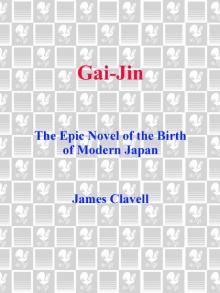 Gai-Jin
Gai-Jin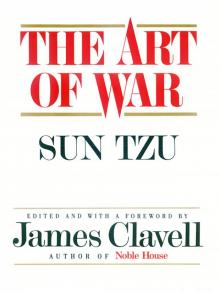 The Art of War
The Art of War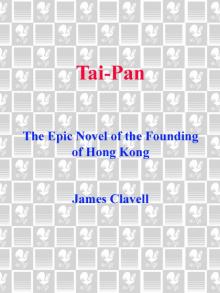 Tai-Pan
Tai-Pan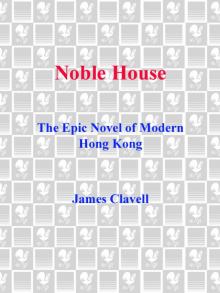 Noble House
Noble House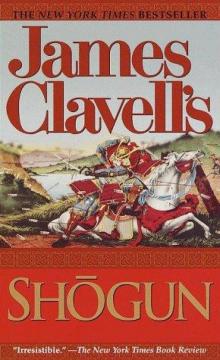 Shōgun
Shōgun Whirlwind
Whirlwind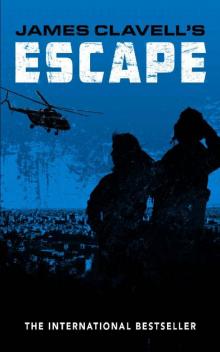 Escape
Escape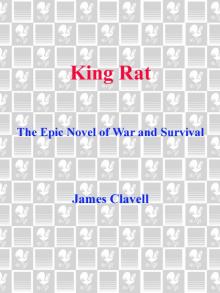 King Rat
King Rat The Children's Story
The Children's Story